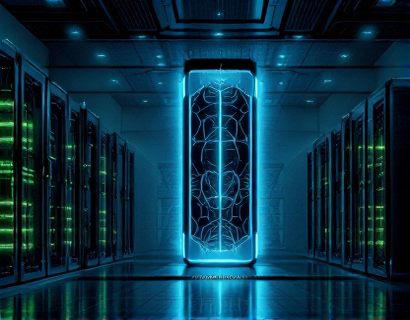Blockchain-Enabled Registry Software: Revolutionizing Data Management
In the rapidly evolving landscape of data management, the integration of blockchain technology has emerged as a transformative force, offering unprecedented levels of security, transparency, and efficiency. This article delves into the realm of blockchain-enabled registry software, exploring how it is revolutionizing the way professionals and enthusiasts approach data management, security, and digital transformation. By leveraging the inherent properties of blockchain, such as decentralization, immutability, and cryptographic security, this software is redefining the standards for registry management.
Understanding Blockchain Technology
Before diving into the specifics of blockchain-enabled registry software, it is essential to grasp the fundamental concepts of blockchain technology. At its core, a blockchain is a distributed ledger that records transactions across multiple computers in such a way that the registered transactions cannot be altered retroactively. This technology ensures that once data is recorded, it becomes nearly impossible to modify or delete, providing a high level of data integrity and trust.
Blockchain operates on a peer-to-peer network, where each participant, or node, maintains a copy of the entire ledger. Transactions are grouped into blocks, and each block is linked to the previous one through cryptographic hashes, forming a chain. This linkage ensures that any attempt to alter a block would require changing all subsequent blocks, a task that is computationally infeasible due to the consensus mechanisms in place.
Enhanced Security through Blockchain
One of the most significant advantages of blockchain-enabled registry software is its enhanced security features. Traditional registry systems are often centralized, making them vulnerable to cyber attacks, data breaches, and unauthorized access. In contrast, blockchain's decentralized nature distributes the data across a network of nodes, eliminating single points of failure and reducing the risk of targeted attacks.
Each transaction in a blockchain is secured through cryptographic algorithms, ensuring that data is tamper-evident and tamper-resistant. This cryptographic security not only protects the integrity of the data but also builds trust among users, as they can verify the authenticity and accuracy of the information stored in the registry.
Transparency and Accountability
Transparency is another cornerstone of blockchain technology, and it plays a crucial role in registry management. In a blockchain-based system, all transactions are recorded in a public ledger that is accessible to all participants. This transparency ensures that every change, addition, or deletion of data is visible and traceable, fostering accountability among users.
For professionals in data management, this level of transparency is invaluable. It allows for real-time monitoring of registry activities, reducing the potential for fraudulent activities and errors. Stakeholders can audit the registry with confidence, knowing that the data has not been tampered with and that all actions are recorded and verifiable.
Efficiency and Streamlined Processes
Blockchain-enabled registry software not only enhances security and transparency but also significantly improves efficiency. Traditional registry management processes often involve multiple intermediaries, manual verifications, and paper-based records, leading to delays, errors, and increased costs. Blockchain automates and streamlines these processes, reducing the need for intermediaries and manual interventions.
Smart contracts, self-executing contracts with the terms directly written into code, can automate routine tasks such as data validation, consent management, and compliance checks. This automation not only speeds up the registry management process but also minimizes human errors, ensuring that data is accurate and up-to-date.
Use Cases in Various Industries
The applications of blockchain-enabled registry software are vast and varied, spanning multiple industries. In the healthcare sector, for instance, patient records can be securely and efficiently managed, ensuring that medical information is accurate, accessible, and compliant with regulations such as HIPAA. This not only improves patient care but also enhances the overall efficiency of healthcare providers.
In the real estate industry, blockchain can revolutionize property transactions by providing a transparent and secure platform for recording and verifying property ownership. This reduces the risk of fraud, speeds up the transaction process, and lowers costs associated with traditional real estate services.
For government and regulatory bodies, blockchain-enabled registries can streamline the management of public records, such as land registries, voting systems, and identity verification. These applications enhance public trust, reduce corruption, and improve the overall governance process.
Challenges and Considerations
While the benefits of blockchain-enabled registry software are clear, there are also challenges and considerations that organizations must address. One of the primary concerns is scalability. Current blockchain technologies, particularly public blockchains, can face performance issues when handling a large volume of transactions. However, advancements in blockchain architecture, such as sharding and layer 2 solutions, are addressing these scalability challenges.
Another consideration is the regulatory landscape. As blockchain technology is still relatively new, regulatory frameworks are evolving. Organizations must stay informed about local and international regulations to ensure compliance while leveraging the benefits of blockchain.
Additionally, the adoption of blockchain-enabled registry software requires a shift in mindset and processes. Organizations must invest in training and education to ensure that their teams are equipped to manage and utilize the new technology effectively.
Building Trust and Credibility
The implementation of blockchain-enabled registry software can significantly enhance trust and credibility in data management. The immutable nature of blockchain ensures that once data is recorded, it cannot be altered without detection, providing a high level of confidence in the data's integrity. This is particularly important in industries where data accuracy and reliability are paramount, such as finance, supply chain, and government services.
For professionals and enthusiasts in these fields, adopting blockchain-enabled registry software means embracing a technology that not only protects data but also builds trust among stakeholders. This trust is crucial for fostering collaboration, innovation, and sustainable growth.
Future Prospects and Innovations
The future of blockchain-enabled registry software is promising, with ongoing innovations set to further enhance its capabilities. The integration of artificial intelligence and machine learning can optimize data management processes, providing insights and predictive analytics to drive better decision-making. Additionally, the development of interoperable blockchain platforms will enable seamless data sharing and collaboration across different systems and industries.
As the technology matures, we can expect to see more widespread adoption and the emergence of new use cases. The potential for blockchain to transform registry management is vast, and organizations that embrace this technology early on will be well-positioned to lead in the digital transformation era.
Conclusion
Blockchain-enabled registry software represents a significant leap forward in data management, offering enhanced security, transparency, and efficiency. By leveraging the unique properties of blockchain, organizations can streamline their processes, build trust, and stay ahead in a rapidly changing digital landscape. Whether you are a professional in data management, a technology enthusiast, or a stakeholder in any industry, understanding and embracing blockchain-enabled solutions is essential for future success.










































